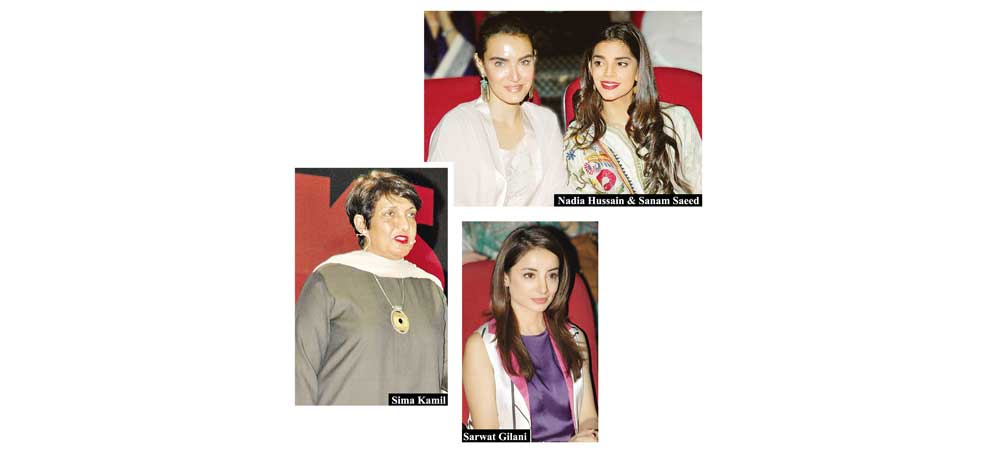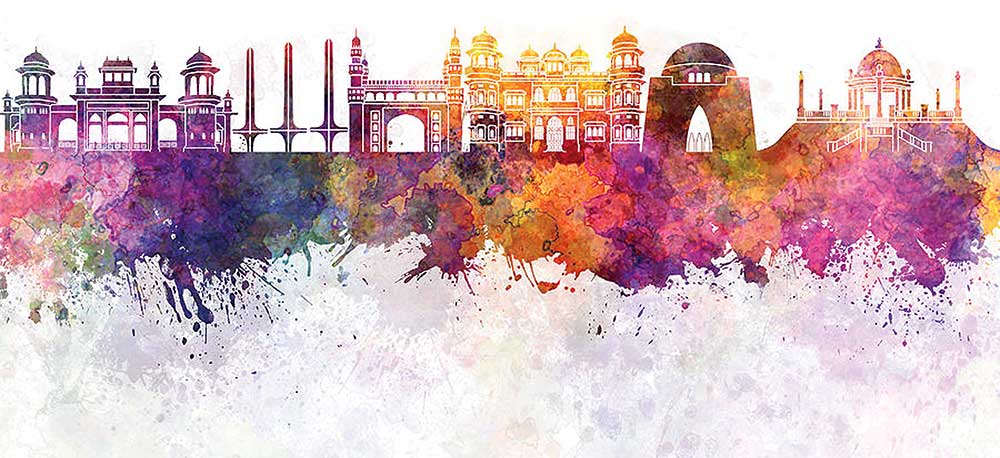Churning out financially independent, self-sufficient women one skill at a time
- 04 Nov - 10 Nov, 2017

"The best thing about being from Karachi is the fact that it will never resent you for hating it, you may scream, you may complain, you may weep and it will listen silently, without retaliation. And then tomorrow, when the sun shines again, and things seem just a little bit brighter, it will welcome you back without asking for an explanation or accusing you of being disloyal. Broken cities do not produce broken people, they sustain strength and promote patience.” Summing up the metropolitan in a mosaic of words, the Executive Director of I Am Karachi (IAK) Ambareen Thompson shared a quote on the city which resonated with her.
The theme of the third IAK Talks was Wonder Women, and the day the Talks were taking place, documentary filmmaker, Sharmeen Obaid-Chinoy won an Emmy for A Girl in The River. As the host, comedian Shehzad Ghias aptly put, “Women, yes, belong in the house, but they also belong in the prime minister house, they belong on an Oscar stage; tonight a Pakistani woman has won an Emmy.”
A platform which is all about reclaiming spaces around the city, this movement driven by the civil society is a stage where dialogue, culture and arts are promoted. According to the president of IAK, Mr Amin Hashwani, “It’s a collective effort by responsible people from the civil society that’s the only way we can succeed and do something sustainable.” Further, he talked about a prevailing concern, “Gender disparity is a major issue when we talk about society. In the World Economic Forum’s Global Gender Gap Report 2016 Pakistan ranks 143 out of 144 countries; we are at the rock bottom.”
The first speaker of the evening was a model, TV actress, entrepreneur and host Nadia Hussain who has mesmerised audiences from the ramp to the small screen, and who wasn’t born in the City of Lights but happens to be a ‘hard core Karachiite’. “I am who I am because of Karachi. I was born in London, and came to Pakistan when I was four,” shares the dentist who graduated from Fatima Jinnah Dental College. “Karachi gave me lots of opportunities,” shares the star who would “enjoy the sea view breeze, cycled, took my dog for a walk. I would wake up at 6, go jogging, then played tennis, and went for swimming too,” says the fashion icon who started modelling in the first year of college. “It was four years after that I got married and had my first baby. I continued modelling even when I was pregnant, and I was the first pregnant model on the cover of a magazine,” she shares her tale of the city which has given her a lot of confidence.
The stage then welcomed a one-woman army, who happens to be a philanthropist, TV and film actress, model and voice-over actress, Sarwat Gilani. The theme of her talk revolved around nature and nurture and the three pillars who have had a major impact on her life. “One very inspiring person to me was my grandfather who was the Nawab of Manavadar, India, Khan Shri Ghulam Moin ud-din. He had 17 villages under his rule, and chose to come to Pakistan during partition and gave up everything to be a part of this great idea. He was given the Hilal-e-Quaid-e-Azam when he came to Pakistan,” shared Gilani. Another pillar of hers was her mother. “Amma taught me to question and raise my voice against the wrongs; she taught me decision-making and philanthropy.” Gilani talks about the school her family ran, “Al Gilani Public School was where Amma taught children from rural and under-privileged areas,” and this is what inspired Gilani to be a brand ambassador for Special Olympics. “My father, an Aitchisonian, held a record of being the top scorer for 13 years,” she talks about her third pillar who taught her ‘responsibility’. A graphic designer by profession, she is also seen on the small screen. But working in the entertainment sphere was disapproved by her grandmother who didn’t speak to her for three years. “‘Hamaray ghar ki larkiyan TV par nahi atin, is what she used to say but my father supported me all along,” says the leading lady who lives by an adage, “lay k tou sab jatay hain, kuch day k jaiye.”
Humans of Karachi founder, photo journalist, and granddaughter of Jamiluddin Aali, Khaula Jamil was the next wonder woman, to take centre stage. “I was born in a patriotic family. My dada had one child born on 14 August and the other on 23 March; my dad was born on 14 August, and we used to sing Jeway Jeway Pakistan while cutting his cake, a song penned by my grandfather,” shares the educationist who teaches at Indus Valley School of Art and Architecture. It was when Jamil returned to Pakistan as a Fulbright scholar, a popular photo project was all the rage on social media. “Humans of New York had started, and soon after the scheme spread across the world,” but Karachi wasn’t on the list yet. After a friend suggested her to start a similar project, Jamil took to the streets capturing portraits and their stories. “One of my first subjects was Mr Tulsi, a janitor at Karachi zoo who asked me in perfect English ‘why are you taking all these photographs?’. I soon found out he was a cook in the times of British rule and had served Germans and French too,” the shutterbug talks about her journey that has helped her “in breaking stereotypes and meeting people in my own city.” Rounding up her discussion she shared Oscar Wilde’s quote, ‘imitation is the sincerest form of flattery’. “What happens when the person who you’re imitating flatters you back?” She questioned the audience; and her flatterer was the founder of the nation. “M. Ali Jinnah left a comment on Humans of Karachi’s Facebook page: ‘my city, the most beautiful one, my people even more! Thank you Humans of Karachi for the reminder’,” the gleaming lady shared a comment left by a page run under the name of Jinnah.
The next shining wonder lady was the elegant and ever graceful Sanam Saeed who went down the memory lane. “My mother, Parween Mody Saeed and I had a very strong bond and did things together. Every Friday we would go to my Nani’s house on Club Road and after lunch Mama would take us on a ghora gari ride,” Saeed talks about how her mother taught her to be self-sufficient and confident. “She took us to all the bazaars and showed us how to walk with our elbows out and always be aware and alert of the surroundings. We would go see turtle-nesting and watched beautiful sunsets having corn. She made our stomachs resilient by making us have roadside food,” and these experiences taught Saeed patience, empathy, humility and to be grateful. “I had an enchanting childhood. Ma was my greatest fan and biggest critic,” she shared the fond memories of yore. The steadfast lady spoke her heart out sharing a maxim: “Speak up for your rights, lend a voice to those who don’t have the confidence to stand up, stay true to yourself, enjoy the city more, be adventurous, start by maybe watching a sunset on sea view, visit a school in Lyari and see how far they’ve come along,” and to stamp her mark on stage she had a knot on her embroidered pashmina in which she carried a plastic bag. “Tie a knot and throw it in the garbage can rather than trashing the streets,” she concluded.
The keynote speakers of the evening were President and CEO UBL, Sima Kamil and TV director and entrepreneur Sultana Siddiqui. Kamil, shared her experience of the city, “I was born in a rather unconventional family; my father being a Muslim and mother a Christian, yet the city always tolerated me. We lived on Jamshed Road and then moved to Garden East and had buns and imli ka pani in the evenings at the park.” Kamil shares, “I wasn’t a good driver and once I hit a mini bus, and it were the people of Karachi who took me to Civil Hospital.” Having done her bachelors from the UK, Kamil lead an independent life for five years and when she returned, she ‘felt life was choking and a bit restricted’. According to the first female head of a major bank in Pakistan, “diversity is one of the city’s strengths.”
As for the last speaker, Sultana Siddiqui, the main rock behind the girls of today are their parents. “Their parents’ trust is what counts the most. A family’s financial standing doesn’t matter, for if the parents are fully supportive of their child then no one in the society has the courage to bring them down,” marked out Siddiqui who believes “women are the best managers.” •

COMMENTS